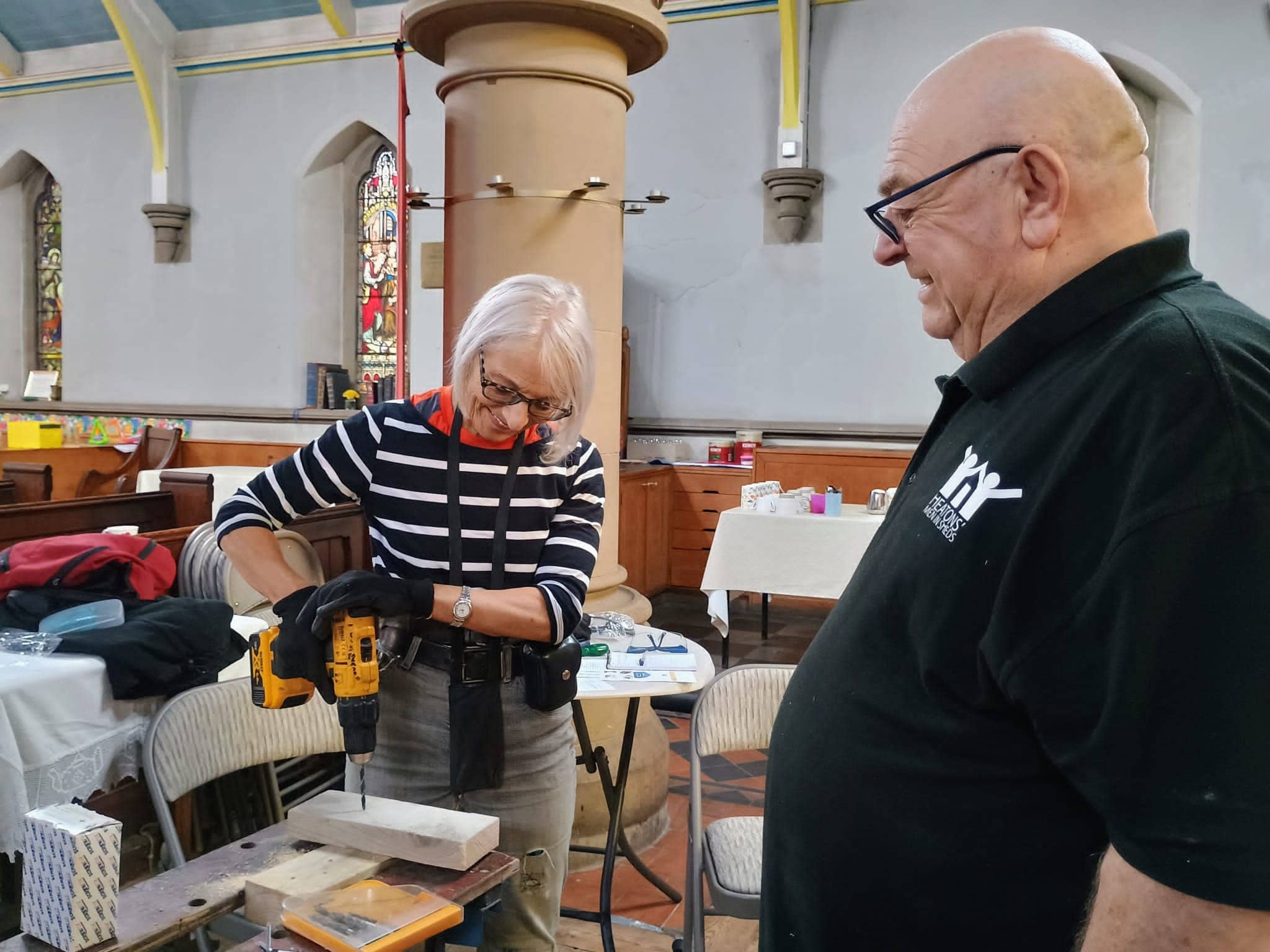Heatons Repair Cafe
The things we buy, use and throw away.
How much stuff is in your home, wardrobe, garage or shed that you have stopped using because it requires a small repair? How often do you think, “It is easier to buy a replacement and take this old one to the tip”? How often do you buy more than you need, because it’s cheap or more convenient?
We all do it; every year, globally, 92 million tonnes of textiles and 50 million tonnes of electricals are thrown away and end up in landfill and, in the UK, we waste 20 million slices of bread every day! This is all in addition to other foods and plastics and packaging waste!
When items are sent to landfill, they decompose, releasing CO2 and methane, which contribute towards global warming and climate change. Some waste, such as e-waste (e.g. computers, mobile phones, and large household appliances) can also leak toxic materials such as lead, mercury and dioxins while they decompose, causing harm to the environment and posing a risk to human health.

One step we can all take is to repair and reuse household items and clothes rather than throw them away and send to landfill.
The Heatons Repair Café, is one local initiative set up in October 2023 to help do that and in its first year of operation we have received 499 items for repair. 380 of which have been successfully repaired – a whopping 76%. This has resulted in a 19,670kg saving in carbon emissions; the equivalent of an average family car driving 33,485 miles!
NB A calculation is made possible by weighing and recording the weight of each item then analysing the carbon footprint of replacing with new.
The Heatons Repair Café is an excellent example of a community working together. Here, the combined skills and enthusiasm of Heatons’ Men in Sheds, Sustainable Living in the Heatons, St Pauls church plus another twenty-one local residents have given up their time to volunteer once a month to repair items and help put them back into circulation. Additional benefits from such initiatives include learning a new skill, meeting others from the area, or simply the enjoyment of a Saturday morning cuppa and chat.

Items brought in so far have included: tables, small electrical items like radios, toasters, lamps, bikes, toys and clothes. Here are a few examples of repairs:
- One family attended with a young child clutching a plastic toy and replacement batteries which we fitted – the parents wanted to demonstrate to the child the importance of recycling and ecology.
- Another young person brought in a small wooden stool made in Sweden by his great grandfather that has been used by four generations of children to stand at the sink to wash their hands HMIS repaired it and hopefully it will last another four generations.
- A lady brought in a rather battered sewing box that had been passed down her family and after some work it is good for a lot more years of service. On the sharpening front a lot of third and fourth generation garden tools have been brought back to useful life including a set of “grandfather’s” edging shears which are reportedly “working better than they ever did!”
This is what a local resident had to say about a recent repair.
“The Repair Café rescued a loved pair of trousers by repairing the zip. I had previously been to a shop which advertised zip repairs for £17 and told it was not worth doing and to buy some new trousers. But that would have meant that my loved and still excellent condition trousers, would have gone into landfill. I wanted to still have my well-fitting, material in good condition, trousers, I just needed a new zip. I took them to the Repair Café and a very friendly and helpful lady fixed them for me! It took a very short amount of time. No cost, just the opportunity to give a voluntary contribution on my way out, which I gladly gave. They did not have a 7 inch zip there but said, if the fix does not work they would put in a new 7 inch zip for me if I came back with trousers and zip. I’m wearing them regularly now and the fix has lasted. I highly recommend going to the Repair Café which I had previously worried would be very busy and crowded, it was not. It was easy to find and everyone was very friendly and helpful. I was there less than an hour and came away very pleased that my trousers are still in use.”
The Repair café movement began in 2009 when a Dutch journalist called Martine Postma brought together a group of friends who were good at fixing things and ran what she called a “Repair Café” – a free event where people could bring their broken belongings and volunteers would help to try and fix them. It was so successful that in 2011 she started the Repair Café Foundation to provide support to local groups hoping to start their own Repair Café. Since then, the concept has grown to over 1,400 events in more than 30 countries.
The aims:
- Prevent everyday items from going to waste, reducing the environmental impact of manufacturing new items.
Encourage learning and sharing of skills in a social setting, maintain repair expertise and to spread this knowledge.
As a household or individual small steps can make a difference:
- Can you reduce the volume or frequency of purchase?
- Could you buy second hand, buy less – buying new results in CO2 emissions from: sourcing the raw materials, the transport, the processing, the finishing, the distribution and the travel or digital footprint making the purchase and that is before you think about the packaging.
- Do you need to replace that item?
- Repair household items and clothes or at least extend the life by a few years.
There are many ways for you to reduce your waste and its impact, examples like the Repair Café demonstrate how a community activity can make a big difference even in a short space of time.
If you would like to volunteer or want more information contact: heatonsrepaircafe@slheatons.org
The Repair Café takes place on the third Saturday of each month in the Community hall behind St Pauls church Heaton Moor Rd, 10.00am – 12noon. There is no charge although donations are welcome.
